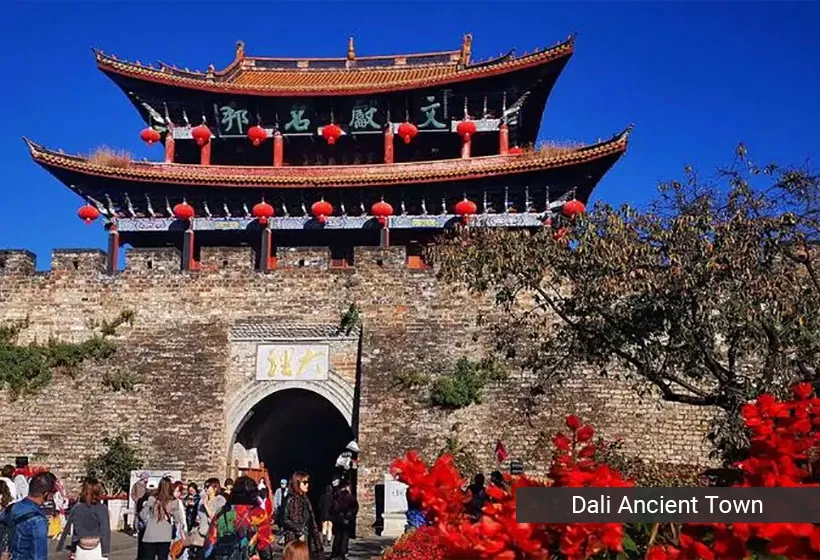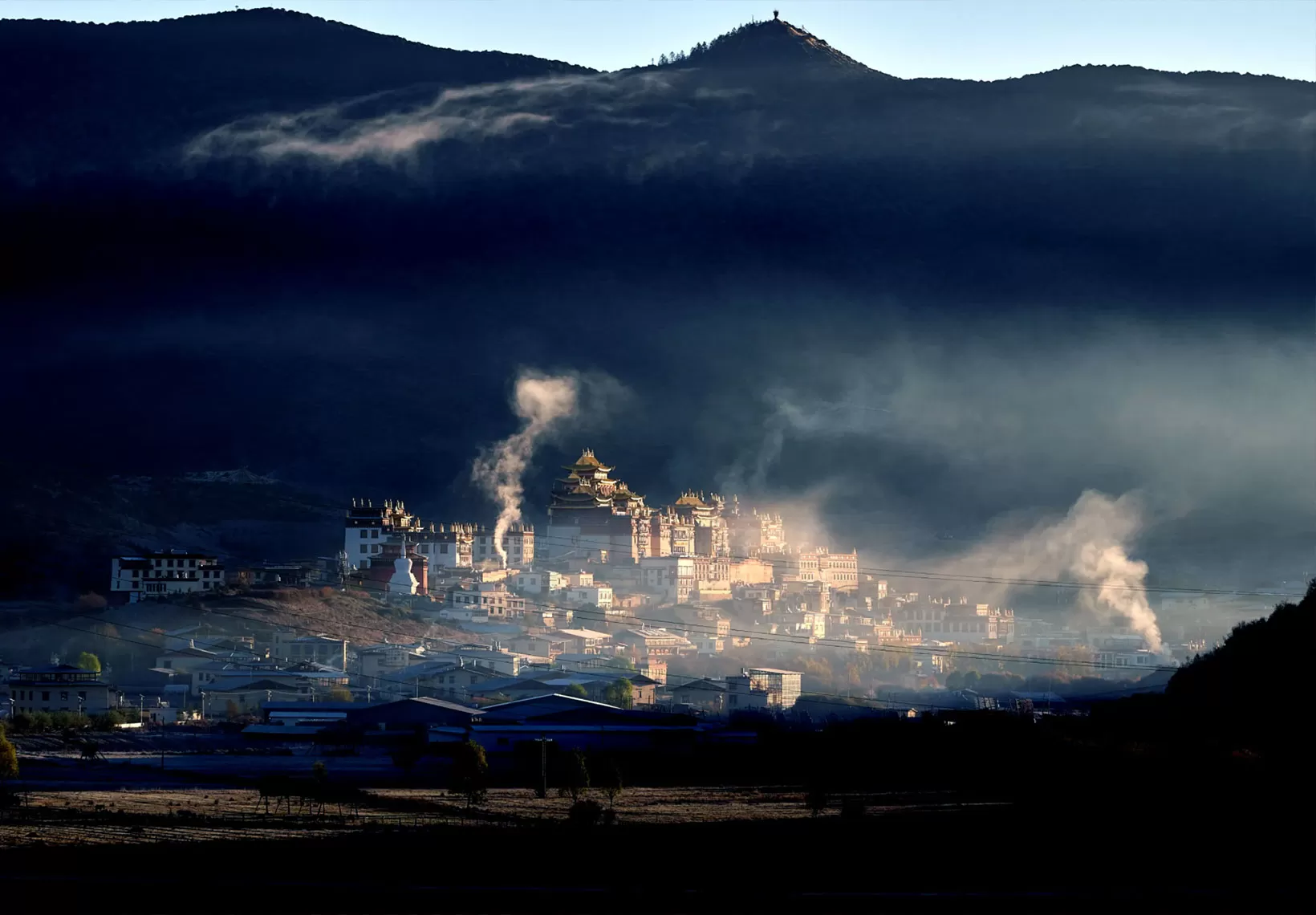Short Introduction to Dali Local Culture: History, Nation, Diet, Clothing, etc
Dali Ancient Town, also known as Yucheng or Zicheng, is one of the first 24 historical and cultural cities in China. It has preserved a wealth of historical relics, including the ruins of Nanzhao Taihe City, the iconic Three Pagodas of Dali, and the Nanzhao Dehua Stele. These sites reflect the city’s rich cultural heritage and historical significance.
Dali is a multi-ethnic area primarily inhabited by the Bai ethnic group. Bai ethnic culture and Han culture come in mixture that sparkles with strong ethnic flavor. Besides, the local costumes, residences, belief and traditional festivals of the Bai people are also dictated by the unique culture it presents to the outside world.
After witnessing thousand years of vicissitudes, Dali is shining as an old but dynamic pearl in the vast land of China. Today, new downtown areas are being constructed, aiming at developing Dali into a city with a combination to modern vitality and ancient antiquity.
Brief History
In the second year of the Yuanfeng era of Emperor Wu of the Western Han Dynasty (109 BC), Yeyu County was established in Dali. By the third year of the Jianxing era in the Shu Han period (225 AD), Yeyu County became part of Yunnan Commandery. In the seventh year of the Taishi era (271 AD), Eastern Heyang Commandery was formed from Yunnan Commandery, and Yeyu County was transferred to it.
The Dali Kingdom (937–1254) was a multi-ethnic regime established by the Bai people, with its capital at Yangjumei City (present-day Dali, Yunnan). During the early Tang Dynasty, Dali experienced several changes in governance, and Dali Ancient Town was founded in the 15th year of the Hongwu era of the Ming Dynasty (1382), covering an area of 3 square kilometers. It is an important historical and cultural heritage site in western Yunnan. For over 500 years during the Tang and Song dynasties, Dali served as the political, economic, and cultural center of Yunnan.
After the establishment of the People's Republic of China, the Xiaguan District was created in January 1950, and in September 1983, Dali County and Xiaguan City were merged to form Dali City.
Ethnic Culture
Dali is a multi-ethnic area primarily inhabited by the Bai ethnic group. Bai ethnic culture and Han culture come in mixture that sparkles with strong ethnic flavor. Besides, the local costumes, residences, belief and traditional festivals of the Bai people are also dictated by the unique culture it presents to the outside world. The customs of the Bai people are primarily reflected in their clothing, cuisine, architecture, festivals, and religious beliefs. Notably, the "Three Courses of Tea" ceremony, the Torch Festival, ancestor worship, and traditional Bai architecture stand out as significant cultural elements.
Ethnic minority clothes of Dali
The traditional clothing of the Bai people is predominantly red and white, featuring bright contrasting colors that highlight the harmony of the overall design. Bai men typically wear white, button-up tops with a black collar jacket adorned with floral trim, paired with loose white or blue trousers. They often wrap a white cloth around their heads and carry embroidered bags over their shoulders.
Bai women usually wear white blouses matched with intricately made, brightly colored tops, and gray-blue or green pants with embroidered hems. They complete their outfits with embroidered shoes and a beautifully crafted short apron decorated with floral or bird patterns along the edges. The hats worn by Bai women are referred to as "Wind, Flower, Snow, and Moon." The tassels hanging down symbolize the "Wind of Xiaguan," the vibrant floral decorations represent the "Flowers of Shangguan," the white top signifies the "Snow of Cangshan Mountian," and the curved shape embodies the "Moon over Erhai Lake." These elements not only showcase Dali's unique ethnic culture but also perpetuate the romantic sentiments represented by the phrase "Wind, Flower, Snow, and Moon.
Ethnic Language
The Bai people have their own language, known as Baiyu, which belongs to the Sino-Tibetan language family, specifically the Tibeto-Burman branch. In the Bai culture, worship of the local deity, known as "Ben Zhu," is a unique form of religious belief. Each village has its own Ben Zhu temple and deity, reflecting the community's connection to their local traditions and spirituality.
Festival of Ethnic
The Third Month Fair of the Bai Ethnic Group(April/May (days 15 to 21 of the third lunar month)): March Street, also known as "Guanyin Market" or "Guanyin Street," is an annual grand festival of the Bai people. Originally associated with religious activities, it has gradually evolved into a trade fair featuring various dances and competitions. The event is held from the 15th to the 21st day of the third lunar month at the foot of Dianchi Mountain, west of Dali City.
The Torch Festival (July/August (days 24 to 26 of the sixth lunar month)):The Torch Festival is a traditional celebration for several ethnic groups in Yunnan, including the Bai, Yi, Naxi, and Jino peoples. Typically held on the 24th day of the sixth lunar month, it features activities such as worshipping the torches, lighting them, and dancing. Known as the "Carnival of the East," the festival is a time to pray for a bountiful harvest and prosperity.
Worship Gathering in the Three Temples:Originating from the Tang and Nanzhao periods, the Bai people's "Ritual of the Three Spirits" is a vibrant festival celebrated from the 23rd to the 25th day of the fourth lunar month each year. This grand traditional festival, recognized as a national intangible cultural heritage, involves lively singing and dancing gatherings for the Bai people of Dali before the busy farming season.
Bai architecture
Bai architecture is characterized by features “Four Pavilions and Five Open Yards”. These structures are primarily made of timber, brick, and stone, showcasing elements like green tiles, white walls, and intricately carved beams. This architectural style creates a tranquil and elegant atmosphere. Notable examples include the Bai architectural complex in Xizhou Ancient Town and the buildings in Shaxi Ancient Town.
Diet Style and Culinary Tastes
Dali, as a historical and cultural city, is home to the Bai people and naturally boasts its own unique and flavorful dishes. Dali's cuisine not only showcases the region's rich culinary culture but also allows visitors to experience the local Bai ethnic customs through tasting. The flavors of Dali include sour, spicy, bitter, sweet, and salty. Such as Sour and Spicy Fish, Xizhou Baba, Milk Fan, Er Kuai. All the delicious foods are a reflection of the wisdom of the ethnic minorities, leaving you with an unforgettable aftertaste.
Cultural Heritage
The Dali Intangible Cultural Heritage Museum showcases the Cang'er Ruins, Bai embroidery techniques, and the Nanzhao Dehua Stele. Dali is also renowned for its unique musical and dance traditions, such as the folk-art forms Daben Qu and Bai Zu Diao, as well as popular dances like the Bawang Whip Dance and the Octagonal Drum Dance, which have been cherished and passed down through generations.
The Dali intangible Cultural Heritage Museum showcases the Cang’er Ruins, Bai embroidery techniques, and the Nanzhao Dehua Stele. Dali is also renowned for its unique musical and dance traditions, such as the folk-art forms Daben Qu and Bai Zu Diao, as well as popular dances like he Bawang Whip Dance and the Octagonal Drum Dance, which have been cherished and passed down through generations.
Customize Your Unique Yunnan Tour

If you are interested in one of the Yunnan itineraries mentioned above, please contact us, and we will be happy to customize it and provide a quote tailored to your preferences.
Alternatively, if you would like to customize your Yunnan Tour, please visit our Yunnan Tour Customized Center. We assure you that you will receive a reply within 24 working hours.
Informative Articles for Your Dali Trip
 Dali Three Pagoda
Dali Three Pagoda- Travel Guide: attractions, seasons, hotels, food, itineraries, etc.
- Top destinations: places to visit in Dali
- Travel itineraries: best itineraries for your reference
- Weather: the best time and seasons to visit Dali
- Top attractions:well-selected top attractions in Dali
- Dali: rich and unique culture
- Cultural immersions: hands-on activities to spotlight your trip
- Unique perspective: top different things to do
- Local food: what to eat while traveling in Dali
- Luxury hotels: where to stay in Dali
- Yunnan Tours: tailor-made Yunnan Tours for your reference
GREAT FAMILY CHINA TOUR
JULY 2024 We wanted to thank Grace at China Culture tour for organizing a great tour of China. We enjoyed our Beijing - Xian-Chengdu -Guilin -Yangshuo - Shanghai trip. Our local guides Bruce in Beijing, Susan in Xian, Jane in Chengdu, Mike in Guilin and Mary in Shanghai took care of us…read more details »
Teng Han L from SINGAPORE
Ready to Create a Unique Dream Travel?


